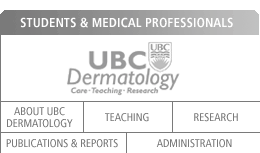|
 |
 |
 |
After medical school, every dermatologist-in-training receives five years of advanced dermatology training to gain expertise to become a medical specialist in the following areas:
- knowledge of the skin, its appendages, and mucous membranes that are both normal and diseased
- making comprehensive scientifically-based diagnosis and treatment plans for skin disorders and diseases, including systemic and infectious disease manifestations on the skin
- diagnosis, research methodology, data presentation, and analysis considering gender, cultural, and ethnic influences
- counselling patients on prevention of skin diseases, identifying risk factors, genetic causes, and environmental concerns
- maintaining a professional attitude in all aspects of patient care
- reviewing and critically assessing current dermatology literature to enhance the diagnosis, investigation, and management of skin disorders and diseases
The five years of additional training is divided as follows:
- 2 years of basic clinical training which must include a minimum of 12 months of internal medicine and 3 months of pediatrics, plus rotations in rheumatology, infectious diseases, and oncology
- 2 years of approved residency training in dermatology which must include a minimum of 1 year in a general hospital
- 1 additional year of training in approved residency training, clinical or basic research related to dermatology, or full time training in pathology
Once fully trained, Dermatologists combine a balance of clinical skills, technical skills, and knowledge to provide the best treatment to their patients.
In short, a Dermatologist is the foremost medical specialist in dealing with the skin, and is the expert you should consult if you have any significant problem with your skin.
What specific training does a Dermatologist have?
Your dermatologist has knowledge and competence in:
- performing dermatologic surgery, including anesthesia, electrosurgery, cryosurgery, nail surgery, biopsy, and excisional surgery
- laser surgery
- cryosurgery
- procedures in allergy and immunology
- clinical pathology
- parasitology
- dermatopathology
- topical and systemic pharmacotherapy microbiology
Once fully trained, Dermatologists combine a balance of clinical skills, technical skills, and knowledge to provide the best treatment to their patients.
With this background and knowledge, dermatologists are singularly qualified to diagnose and treat the wide variety of dermatologic illnesses and conditions. Dermatologists also have expertise in the care of normal skin and in the prevention of skin diseases and skin cancers. |
|
 |
|

